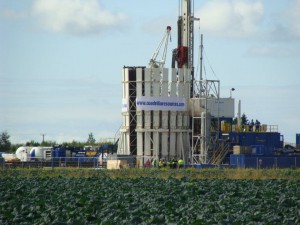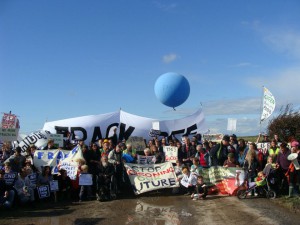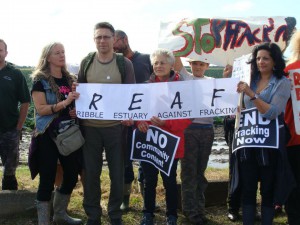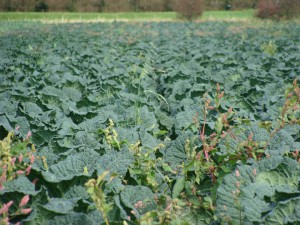Ribble residents fight back against fracking
Article published: Thursday, September 29th 2011
Last week’s announcement that over 200 trillion cubic feet of shale gas could have been discovered deep beneath Lancashire’s Flyde coast sparked giddy expectations of a “gold rush” in the Ribble estuary. But will the find make Blackpool the new Dallas, or is it hot air from an energy company trying to overwhelm opposition to the arrival of ‘fracking’ in the UK? Lisa Ansell reports.
Walking through the village of Hesketh Bank in West Lancashire, you can see why the residents are so proud of this green belt area. At the village’s busy agricultural show people repeatedly emphasised how when you buy British produce from Tesco or Marks and Spencer, it was probably grown here.
Modern agriculture thrives in this area, and local politicians such as Conservative councillor Malcolm Barron boast that just two of the many local growers export roughly £90 million in fruit and vegetables each year. Planning regulations in the green belt are strict. Unsurprisingly, the appearance of a gas rig in the middle of a field of cabbages caused some upset.
The rig was the property of Cuadrilla Resources, an energy company financed by Australian engineering corporation A. J. Lucas and a joint private equity venture between the well-connected Carlyle Group and Riverstone Holdings. Cuadrilla Resources are there to explore the area’s potential for a technique known as hydraulic fracturing, or ‘fracking’. A process that releases gas held in shale deposits deep underground by fracturing the rocks with large injections of water, sand and a chemical mix.
What the frack?
Residents joked that the brightly lit rig arrived in the area like “aliens landing”, and have formed the campaign group Ribble Estuary Against Fracking in response to what they felt were consistently frustrated attempts to raise concerns about the site. At a farm one mile down the road from Hesketh’s agricultural fair they were joined by activists and organisations from across the country at “Camp Frack”, a gathering where residents and others such as Campaign Against Climate Change, the Green Party and the Co-operative Group could learn from one another and link into wider campaigns.
At the camp Doreen Stopforth, who lives across from the rig, explained how the only effort at consultation on granting Cuadrilla permission for exploratory fracking she had seen was an A4 piece of paper pinned to a lamppost found while walking her dog down a remote dirt track. For their own part, a Cuadrilla spokesperson was careful to specify to Manchester Mule that the company is only required to “engage” with residents, not consult them. The presence of four uniformed police officers and a not very discreet riot van at the agricultural show in case of “trouble” from the “protest camp” raised chuckles and eyebrows across the village.
Banned in France, Switzerland and several US states, fracking has proved controversial wherever it has been tried. Although the precise batch of chemicals used in injections is a trade secret, EU researchers have identified substances such as neurotoxins and the carcinogen benzine as part of the mix. Scientists at the Tyndall Centre for Climate Change Research found the process to “pose significant potential risks to human health and the environment”, and called for thorough research into “the potential for hazardous chemicals to enter groundwater via the extraction process”.
Competent authorities?
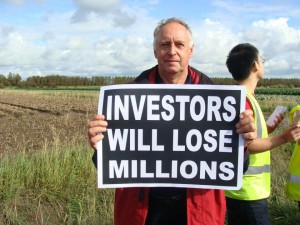 Cuadrilla downplayed these risks in their memorandum to the Commons Select Committee for Energy and Climate Change, arguing that “as of 2009…US regulators have confirmed no cases of hydrocarbons or frac[k]ing fluid leaking into shallow water aquifers”. The company said they had complied with “all necessary planning, environmental and health and safety permits from the competent local and national authorities”, echoing claims made in the Guardian by Energy Minister Charles Hendry that UK shale gas exploration “is governed by one of the most robust and stringent regulatory frameworks in the world.”
Cuadrilla downplayed these risks in their memorandum to the Commons Select Committee for Energy and Climate Change, arguing that “as of 2009…US regulators have confirmed no cases of hydrocarbons or frac[k]ing fluid leaking into shallow water aquifers”. The company said they had complied with “all necessary planning, environmental and health and safety permits from the competent local and national authorities”, echoing claims made in the Guardian by Energy Minister Charles Hendry that UK shale gas exploration “is governed by one of the most robust and stringent regulatory frameworks in the world.”
That has not been the experience of residents of Hesketh Bank and nearby Tarleton. Cuadrilla’s application for temporary exploratory bore holes, the earliest of which date back to 2009, triggered neither an environmental impact assessment nor consultation with residents. Letters between the company and government officials seen by the Guardian revealed a largely self-regulated industry, with no specific rules governing either “unconventional” gas extraction or the disposal of waste water. The documents in the planning application for the rig at Hesketh Bank contain little more than an assessment of the rig itself, and the possible impact on birds and traffic.
Permission was given to go ahead with the site even after two earth tremors which coincided with initial explorations prompted a temporary moratorium. Despite past associations between earthquakes and hydraulic fracturing in the USA an ongoing report into the causes of the tremors has not yet been released, and the Department for Energy and Climate Change disclosed to Mule that the consultants carrying out the investigation have themselves been appointed by Cuadrilla.
Dampened expectations
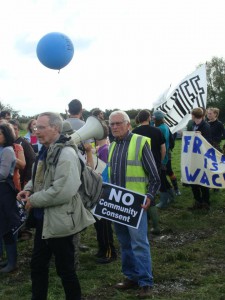 Malcolm Barron, one of the councillors whose name appeared on the site’s planning application, spoke of his desire to see new industries which would keep young people in the area, many of whom are pushed out by property prices. “They have good jobs in London, we need jobs here,” he said, adding his belief that “genuine talent [is] going south.”A genuine concern but one easy to exploit, and the jobs figures anticipated by Cuadrilla’s economic outlook report should be approached with caution.
Malcolm Barron, one of the councillors whose name appeared on the site’s planning application, spoke of his desire to see new industries which would keep young people in the area, many of whom are pushed out by property prices. “They have good jobs in London, we need jobs here,” he said, adding his belief that “genuine talent [is] going south.”A genuine concern but one easy to exploit, and the jobs figures anticipated by Cuadrilla’s economic outlook report should be approached with caution.
Key to the company’s formidable publicity campaign aimed at local decision makers is the promise of creating 5,600 jobs with an average wage of £25 per hour, 1,700 of which will be based in Lancashire. The projected pay of £25 an hour, roughly £55,000 per year, was derived by the company by taking the Office of National Statistics (ONS) 2009 figure of an £89,800 average full time salary for male workers in the petroleum and natural gas extraction industries and dampening it down “to account for the fact that some employment will be in less well paid sectors/occupations.”
Selecting the average male full time income ignores both female and part-time employees who typically earn less – the actual average wage for all individuals employed in the industry is £80,000, which is itself skewed upwards by high executive pay at the top of the corporate ladder. A breakdown of the jobs which current Lancashire residents can expect to receive is not given and Cuadrilla expects “the attraction of specialist suppliers” from other areas of the UK and overseas, who are likely to take up most of the highest-earning positions.
“Pie in the sky”
As to the estimated 1,700 jobs that Lancashire will gain, the model used to predict the increase does not distinguish between those directly employed by Cuadrilla or indirectly employed by the firm’s suppliers and indeed, the companies which supply Cuadrilla’s suppliers. Such a technique risks the double-counting of jobs across different sectors and its use elsewhere has been criticised as being based on “dubious statistical concepts” by the former advisor to the Treasury and the British Bankers Association Brendon Sewill, who noted how if every sector “used the same technique the number of people employed in British industry would far exceed the total population”.
Cuadrilla’s claim to have identified 200 trillion cubic feet of shale gas in Lancashire’s Bowland basin was excitedly reported as creating a potential “Aberdeen effect” comparable to North Sea oil. This excitement quickly dissipated as Cuadrilla’s publicity claims crumbled under scrutiny. When contacted, the firm clarified that only between 10 and 30 per cent of the “discovered” resources would be recoverable, and the find would only apply if they drilled enough wells to cover the entire gas basin.
Steve Holditch, a geologist from Texas A&M University, described the claim to Reuters two days later as “pie in the sky” and questioned Cuadrilla’s ability to make such an assessment given so little data. Many of the figures extrapolated from old explorations and the fortuitous “find” was announced one week after it was reported that a refinancing deal had to be agreed with the Chinese state-owned oil group CNOCC after Cuadrilla’s backers A. J. Lucas, who own 41 per cent of Cuadrilla, struggled to cover their debts.
Nonetheless Cuadrilla’s executives argue that “unconventional gas drilling” can provide a “triple win” for governments in the face of climate change and dwindling energy supplies, with European gas production expected to decline 30 per cent by 2035. Fracking, the company says, can contribute to key objectives such as “enhancing energy security…lowering the cost and price of energy” to consumers and “reducing greenhouse gas omissions”. Others dispute this, with the report to the EU pointing out that “greenhouse gas emissions from unconventional gas supply are significantly higher than from conventional gas supply”. The study added that “resources for unconventional gas in Europe are too small to have any substantial influence on these trends”, and could even be “counterproductive” by providing the misleading impression of an “ensured gas supply”.
Little substance
In addition, the economic outlook report confirmed that Cuadrilla would only be drilling until 2021, contradicting earlier suggestions recalled by residents of a likely 30 year lifespan of fracking in the area. Such little substance in a report presumably intended to reassure politicians and investors raised worries, and some scepticism, given the financial issues experienced by A. J. Lucas.
The press conference announcing the shale gas discovery was described by Doug Parr of Greenpeace as a “pitch” to Lancashire County Council, while local Labour councillor Jon Hodson spoke to Mule of a tightly managed affair overseen by numerous public relations people. Liberal Democrat councillor Sue McGuire described the picture the company painted as “Disneyland”.
Water supplies are especially important for agricultural areas such as Hesketh, and the Commons Energy Select Committee when giving the green light to fracking were careful to note that the volumes of water required could challenge resources “at times of drought in low rainfall areas”. While West Lancashire is not precisely a low rainfall area, the Tyndall Centre noted that the Environment Agency has classified the river catchment zones where fracking is likely to take place as “either ‘over licensed’, ‘over abstracted’ or ‘no water available’” according to its Catchment Abstraction Management Strategy.
Vital concerns
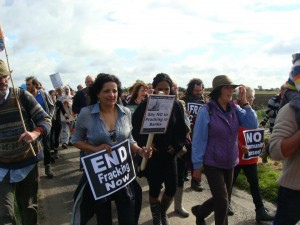 Cuadrilla has not yet made an application to purchase the water required for commercial extraction but the volumes required means it cannot automatically assume that the regional supplier, United Utilities, will be able to meet the demand. Speaking to Mule, United Utilities explained that any application would trigger an environmental impact assessment – one likely to be more stringent than any triggered by the planning applications they have made.
Cuadrilla has not yet made an application to purchase the water required for commercial extraction but the volumes required means it cannot automatically assume that the regional supplier, United Utilities, will be able to meet the demand. Speaking to Mule, United Utilities explained that any application would trigger an environmental impact assessment – one likely to be more stringent than any triggered by the planning applications they have made.
Such concerns are vital for the area, but correspondence seen by Mule between local Labour councillor Jon Hodson and the clerk of his parish council indicates the difficulty for local democracy in bringing Cuadrilla’s operations out into the open for proper discussion. Despite agreement at the council that the company should be an item for discussion the clerk removed it from the agenda, asserting that because Cuadrilla as yet has “no intention of placing a permanent application” in the area there was nothing to discuss.
In the exchange that followed the clerk did not understand why local residents would not want to simply rely on “informed comment and observation” from Cuadrilla, dismissing objections as to their reliability. When Cuadrilla’s status as an objective source of information was questioned, the clerk accused Hodson of a mere “pre-disposition to oppose this development”, and urged him to “do everything in your power to present a fair and balanced view to residents on the subject and support our proposals”.
The episode has left many residents questioning the ability of local democracy to deal with decisions when faced with the weight of powerful interests. The thrall of Cuadrilla’s PR campaign over their representatives and media left them with few avenues to pursue, but with the wheels falling off the company’s PR machine people who never anticipated learning protest methods and the intricacies of labyrintine planning bureaucracy are now working with national and international campaigns against fracking. Little more than a week after the good natured protest at the end of Camp Frack, this fight looks winnable.
More: Environment, Features
Comments
-
[…] Read More: Ribble residents fight back against fracking […]
Pingback by Ribble residents fight back against fracking | Oil Shares - BP Share Price on September 30, 2011 at 8:12 am -
Manchester Mule tells us of the Nimby concerns of Tory voters in affluent and rural Lancashire.
Whatever next?
Doesn’t that gas rig look lovely and enhance the landscape – just like wind turbines.
Comment by simon on October 2, 2011 at 12:58 pm -
> Nimby concerns of Tory voters in affluent
> and rural LancashireThe tory landowners hid behind their estate gates. The majority of protesters where normal local people with little interest in politics and more than a casual concern for preserving the countryside and a clean local environment where 100’s of people live.
As an side, that’s not a ‘gas rig’ its a drilling rig. The main concern is that of scale. Estimates are now running at 120 x 10 well pads, with 1.5 mile spacings and with all the infrastructure and risk that goes with that.
Comment by REAF on April 13, 2013 at 9:25 am -
Camp Frack 2
Comment by REAF on April 13, 2013 at 9:27 am
10/11/12 May 2013
http://www.campfrack.org -
[…] – ‘Ribble residents fight back against fracking’, Mule, Sept 2011 […]
Pingback by Fracking with our food supply | Frack Off on April 29, 2013 at 8:38 am
The comments are closed.

